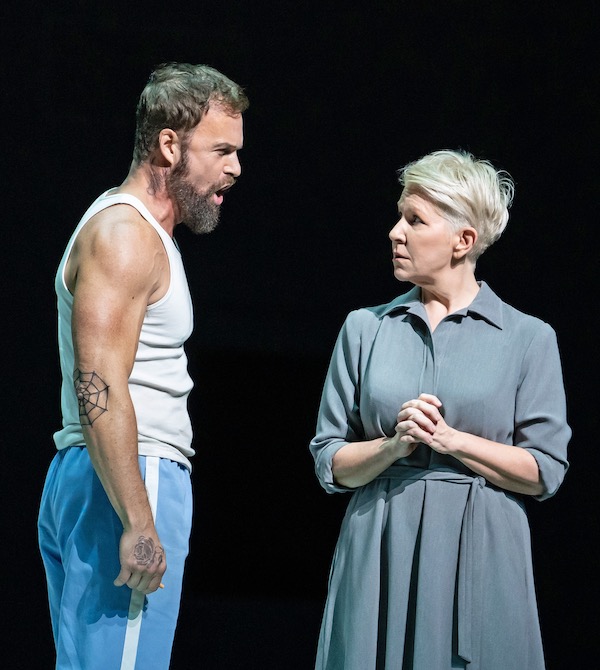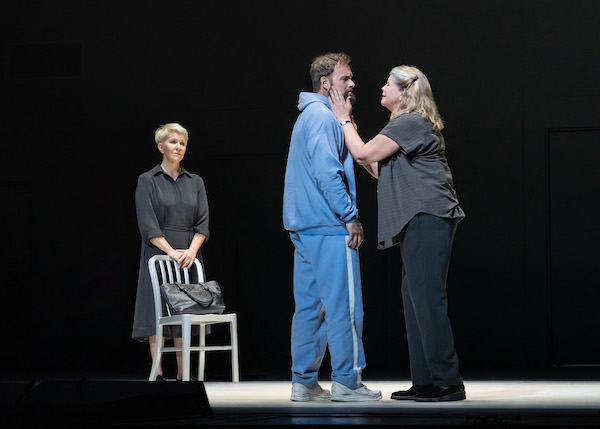“Dead Man Walking” powerfully opens Met season, video excess apart

It was a long trek, but Dead Man Walking finally made it the last mile to the Metropolitan Opera Tuesday night.
The death-row drama by composer Jake Heggie and librettist Terrence McNally has attained the status of a contemporary classic, logging over 70 productions worldwide since its premiere at the San Francisco Opera in 2000. At long last, a new production by Ivo van Hove, postponed from the Met’s canceled 2000-21 season, opened the company’s 2023-24 season.
In Tuesday’s cast were the two mezzo-sopranos who have recorded the role of Sister Helen Prejean, the real-life nun and spiritual advisor to convicted murderers (and later, outspoken opponent of the death penalty): Susan Graham, who created the role in San Francisco, and (as Sister Helen) Joyce DiDonato, who performed and recorded it with the Houston Grand Opera in 2010.
It was also not the first time around the track for the vocally and physically imposing Ryan McKinny as the murderer Joseph De Rocher, having performed the role in Chicago in 2019, with Graham appearing as De Rocher’s mother. She repeated that role Tuesday night.
Suffice it to say that, for the Met’s first go at Dead Man Walking, the company engaged singers who already knew their way around the score. The new elements of this production included conductor Yannick Nézet-Séguin, whose sensitive pacing matched the drama’s emotional swings from frozen desolation to heart-pounding terror, and director van Hove, whose bold visual concepts served the material better at some points than at others.
Heggie’s score—whose default was a burble of horns and woodwinds under the dialogue, occasionally rising to a pounding beat or a percussive roar—supported the drama without calling attention to itself. An invented “old hymn tune,” Sister Helen’s theme throughout the opera, was the nearest thing to what the real-life Sister Helen requested from Heggie—“melodies that people can hum.”
While Heggie was right to say there were opera-size emotions in Sister Helen’s dive from a prisoner’s pen pal to the depths of the death-penalty machine, the composer mostly bypassed showy coloratura in favor of knotty inner feelings. Always solid vocally, DiDonato embodied vulnerability as her character was battered by guilt, self-doubt and disgust to the point of collapsing to the floor as the lights went down on Act I.
One rooted for her faith to rally her in Act II, which it did, in scattered moments of reconciliation with the murderer and the victims’ parents. But the opera offered no feel-good solutions to the twin horrors of teenagers killed by an angry drunk and a man cold-bloodedly killed by the state.
According to the composer, from the start he and McNally insisted that these traumatic events be depicted onstage, not just implied or referred to. This production handled the two dramatic bookends in radically different ways: the crime in a blurry night video to start the opera, with the teens and their attackers in a chaotic struggle ending in dimly-seen shooting and stabbing, and the killer’s execution in a brightly lit room, a slow, clinical process of lethal injection, videoed live and projected many times life size in excruciating closeup.
Composer and librettist said they were creating a spiritual drama, not a polemic, but it seemed van Hove’s stark version of this closing scene would make a death-penalty opponent out of all but the hardest-hearted.
Live video was used elsewhere in the more introspective second act, not for shock value but just for a kind of movie-style psychological realism in closeups. This choice was understandable, given viewers’ expectations these days in visual entertainment. Still, one doesn’t like seeing it seep into opera, an art form that derives much of its impact from the performers’ extraordinary ability, on their own, to project their voices and actions to the back of the house.
On Tuesday, the life-size DiDonato and McKinny, standing and delivering onstage, had to compete for viewers’ attention with their own enormous images projected overhead. This is normal and expected at a Taylor Swift concert, but in an opera house it breaks a fundamental compact between singers and audience. Is voice amplification next?
Happily, no one needed amplification in this cast—especially the powerful soprano Latonia Moore as Sister Rose, Helen’s BFF and voice-of-reason in the nuns’ order, for whom Heggie wrote the most soaring, operatic lines in the score.
The somewhat stereotyped depictions of De Rocher as a brawny brute doing pushups in his cell and his mother as a stooped, shuffling piece of trailer trash, attributable equally to the libretto and this production, were quite a departure from the subtler characterizations in Prejean’s book. The comic-book contrast between these rural yahoos and the murder victims’ immaculately dressed and coiffed parents seemed needlessly exaggerated as well. (On the other hand, pointed class distinctions in opera are as old as Rosenkavalier and Figaro.)
The singers nevertheless were in fine voice and did well by their roles, especially Graham, finding many shades of guilt and disorientation as Mrs. De Rocher, and Rod Gilfry as Owen Hart, the most vocal of the victims’ parents, tormented by the loss of his daughter, the breakup of his marriage, and his own mean treatment of Sister Helen.
The unadorned planes of Jan Versweyveld’s set served as bare prison walls and as screens for Christopher Ash’s evocative, prerecorded videos of the open road as Sister Helen drove to the prison and was pulled over for speeding (in a humorous scene with Justin Austin as the motorcycle cop).
Versweyveld’s design included lighting the set to create large or small spaces, and moods from bright and objective to murky and depressive. Entrances by the large cast of prisoners took place in clouds of Wagnerian fog whose purpose wasn’t clear—a metaphor for their subterranean existence, perhaps?
Sound designer Tom Gibbons made his Met debut with car radio chatter in the violent prologue and subtle, scene-setting effects that enhanced the rest of the drama.
Dead Man Walking runs through October 21. metopera.org
